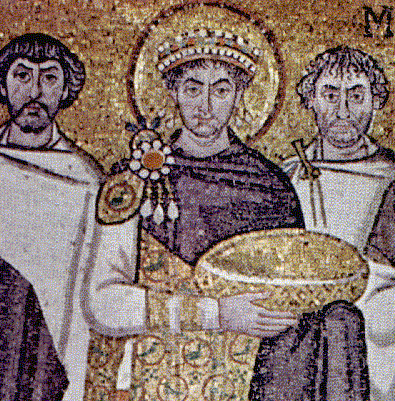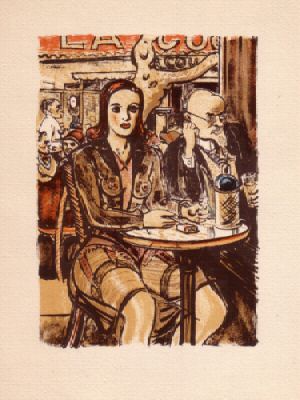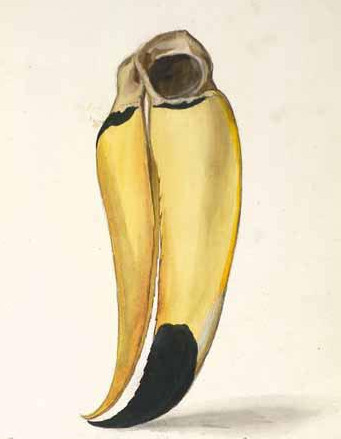FCWWBDNITHBR
Today: Moby Dick of Moby-Dick: Or, The Whale by Herman Melville, and Judge Holden of Blood Meridian: Or, An Evening Redness in the West by Cormac McCarthy. And albino whale and an albino man, each of great size and power, and secret knowledge.
Inside the deep and musty Jungian reaches of the butterfly psyche in the pit of our human selves there is a menacing, chthonic monster that roils and broods its thousand dubious nightmares to fuel the heat of doubts and of fears. And that monstrous semi-deity, that imp of the perverse is the animal side and the cunning, terrible, swift, strong side of us. It shows up all over the place in art and literature. Leviathan—the coiled serpent of the deep—is perhaps the most famous and resonant of its forms, being the one that figured prominently in the Bible as a symbol both of foreboding and of the Wrath of God and also the convenient figure of Hobbes’ meditation on the power of kings and political-economic nature of the emerging nation-state. Folk tradition (though not the text) has Leviathan as the whale that swallowed Jonah. (“Leviathan” is specifically referred to in Psalms, Job, and Isaiah—e.g: “Canst thou draw out leviathan with an hook? Will he make many supplications unto thee? will he speak soft words unto thee? Will he make a covenant with thee? wilt thou take him for a servant for ever? None is so fierce that dare stir him up: who then is able to stand before me?” Job 41: 1-10). It is of whales and leviathanous monsters human and cetacean that I sing to you today, O weary blog-traveler.
Summaries for each book from the internet—so that we can start off here with a little background, a little common ground:
Moby-Dick
Moby-Dick is an 1851 novel by Herman Melville. It describes the ill-fated voyage of the whaling ship Pequod to find and destroy the eponymous white whale, driven by the obsessive Captain Ahab. The language is highly symbolic and many themes run throughout the work. The narrator's reflections, along with complex descriptions of the grueling work of whaling and personalities of his shipmates, are woven into a profound meditation on hubris, providence, nature, society, and the human struggle for meaning, happiness, and salvation.
Blood Meridian
"The men as they rode turned black in the sun from the blood on their clothes and their faces and then paled slowly in the rising dust until they assumed once more the color of the land through which they passed." If what we call "horror" can be seen as including any literature that has dark, horrific subject matter, then Blood Meridian is, in this reviewer's estimation, the best horror novel ever written. It's a perverse, picaresque Western about bounty hunters for Indian scalps near the Texas-Mexico border in the 1850s--a ragged caravan of indiscriminate killers led by an unforgettable human monster called "The Judge." Imagine the imagery of Sam Peckinpah and Heironymus Bosch as written by William Faulkner, and you'll have just an inkling of this novel's power. From the opening scenes about a 14-year-old Tennessee boy who joins the band of hunters to the extraordinary, mythic ending, this is an American classic about extreme violence.
Natural History
The sperm whale (Physeter macrocephalus) lives as long as 80 years and thus Moby Dick is certainly long dead. Humans (Homo sapiens) live as long as 120 years, though they average around 80 themselves, and so The Judge is certainly dead as well. I point this out because, as you shall see, the characters are dead, but I think that their true-to-life selves are very much alive and even immortal and immorbid for all peoples and times of peoples.
The sperm whale is known to exhibit albinism, and thus white members of the species are real life things, observed by sailors and scientists. And an 85 foot sperm whale attacked the trawler Essex of Nantucket in 1820, splintering the ship and killing all but 8 of her crew: a real-life event that inspired Melville’s tale. Moby Dick is real.
Raiding parties in the American West are no new thing, scalping of Native Americans by bandits was, while not exactly common, not unheard of either. And the inspiration for Cormac McCarthy’s book was the actual gang of raiders helmed by John Joel Glanton operating in Texas and Mexico in 1849 and Judge Holden was a member of that gang. The Judge is real.
The Desert where the Judge is king of terrors and terrorists is the same psychic space as the rolling seas where Moby Dick holds his aquatic domains. Great expanses of salty nothingness; be they the alkali flats of the borderlands or the wine-dark seas and great Ocean themselves. As Melville writes: “The ocean is the dark side of this earth and is two-thirds of this earth.” Just as the mind is mostly unknown, even—especially—to the one whose brain is the mind’s flop-house. No questions asked, payment’s due once a week on Friday. We are mostly saltwater supporting a brain and we are undiscovered country as surely as death because we are death and alkali deserts ourselves.
Melville to McCarthy
“See the child. He is pale and thin, he wears a thin and ragged linen shirt. He stokes the scullery fire,” begins Blood Meridian, “His folks are known for hewers of wood and drawers of water but in truth his father has been a schoolmaster. He lies in drink, he quotes from poets whose names are now lost.”
And the beginning to Melville’s Prologue to Moby-Dick, before even the calling of Ishmael, the cast-aside son: “The pale Usher- threadbare in coat, heart, body, and brain; I see him now. He was ever dusting his old lexicons and grammars, with a queer handkerchief, mockingly embellished with all the gay flags of all the known nations of the world. He loved to dust his old grammars; it somehow mildly reminded him of his mortality.” This Usher, this schoolteacher is the source of Melville’s etymology of the Whale and the figurative father of our ingénue-protagonist in Blood Meridian. Still coughing out old grammars and Ovidian poetry to explain the world and birthing and then sending off the innocents onto the plain of vasty violent fields.
Harold Bloom, in the introduction to the most recent edition of Blood Meridian calls that books the fulfillment of the promise of American letters first made by Moby-Dick, and the Judge is heir to the Whale as antagonist.
Melville, it must be remembered was a Yankee in the truest sense. He worked as a customs agent in a sinecure position for a Republican administration and he had shipped with merchantmen in the grandest of Yankee traditions. His was a sharp world, all commerce and politics. When shipping off to the Ocean, he was examining the perversity of human existence. To crawl the underside of the world and wash away his deep entrenched sensibleness. Ishmael’s avowed purpose in setting out is to get away from it all and enjoy the freedom of the waves. But to go a-whaling is to impose commerce and politics on the deep in the form of the moving factory and community of the ship. The Pequod is a piece of Protestant ingenuity out there on the water, owned, even, by two bilious and upright Quaker men. Melville is deconstructing the whole of society and pitting it in a losing battle with the Leviathan. The parallel with McCarthy creeps up again. The scalping party in Blood Meridian is a commercial venture. Rape and murder and the fowl depths of human sin is wrapped up in the pioneer spirit, western expansion, and the expansion of white men’s “morality” into savage wastes. And again the enterprise is corrupted not by its circumstances, but by its purpose. The boy in Blood Meridian is witness and party to great crimes and comes away like Moses down from the mountain. Seeing God, not in His wrath alone, but in His glory. Just as Ishmael ends, the cast away son of a lost tribe.
Metaphysics
It is simple to say that Judge Holden is the Devil. It is not wholly inaccurate and neither is entirely the case. Just as Moby Dick is an evil thing, our White Whale is not entirely the devil, nor the Prince of Lies, Flies, or any other product of the infernal pit. But rather it is part of his natural-ness that makes him evil, or at least seem so. The terror of Moby Dick is the terror of the Leviathan, the terror of the deep. There is, in him, the capacity to make madmen of sober New Englanders and to gaze back at you from the abyss. Moby Dick is elemental and powerful, a Gnostic force, a representation of the all-wide natural world that we do not know nor understand nor have plumbed inside and out our hardened carapaces of logic and faith. They are the creations of the Old Testament God, that blind and mad creator of the Albigensian heresy. They are the angel/devils that intercede for the God of the Covenant and enforce his terrifying order. They are part of that order.
If Moby Dick is the Leviathan in Job, then Judge Holden is that Satan that sups with God and makes friendly sport with Him in (and of) Job. And as natural creatures of the world they are both subject to and exemplary of its laws. They are the natural law, the true order of things and not this Novo Ordo Seclorum that Enlightenment and government and the US and Europe promises. This attitude is what makes Melville and McCarthy Romantics, though like Faulkner between them, dark and pitiless Romantics, in awe out of necessity and not pleasure (like those English panty-wastes).
The Judge is a scientist, and ruthless exposeur of the natural order in the face of human comforts about civilization and religion:
He knows the workings of God’s mind and he lives out their terrible truth and lectures on their secrets. His rationality, his science is not liberating, it is his means of destroying the world and corrupting those in it. He is death, destroyer of worlds.“In the afternoon he sat in the compound breaking ore samples with a hammer, the
feldspar rich in red oxide of copper and native nuggets in whose organic lobations he purported to read news of the earth’s origins, holding an extemporary lecture in geology to a small gathering who nodded and spat. A few would quote him scripture to confound his ordering up of eons out of the ancient chaos and other apostate supposings. The Judge smiled.
Books lie, he said.
God don’t lie.
No, said the Judge. He does not. And these are his words.
He held up a chunk of rock.
He speaks in stones and trees, the bones of things.
The squatters in their rags nodded among themselves and were soon reckoning him correct, this man of learning, in all his speculations, and this the judge encouraged until they were right proselytes of the new order whereupon he laughed at them for fools.”
Moby Dick destroys the floating world of the Pequod with his bulk not out of wrath, because Leviathan is not a creature of wrath (rather it executes the wrathful will of the universe), but because it is there and that is its purpose: to strip away the civilized and make us part of the natural order. Moby Dick is the subject and object of wrath, the wall against which the whole of humanity bangs its head and asks why there is evil? and what can be done for the children? The answers are: You, and Nothing. The Whale is the agent of the universe in its least compassionate aspect:
“Retribution, swift vengeance, and eternal malice were in his whole aspect, and spite of all that mortal man could do, the solid white buttress of his forehead smote the ship’s starboard bow, till men and timbers reeled.”What is the Whale to men and men to the Whale? Melville answers us:
"The White Whale swam before him as the monomaniac incarnation of all those malicious agencies which some deep men fell eating in them…That intangible malignity which has been from the beginning…deliriously transferring its idea to the abhorred white whale, he pitted himself, and all mutilated against it…all the subtle demonisms of life and thought; all evil, to crazy Ahab, were visibly personified and made practically assailable in Moby Dick. He piled upon the Whale’s white hump the sum of all the general rage and hate felt by his whole race from Adam down; and the, as if his chest had been a mortar, he burst his hot heart’s shell upon it.”Red in tooth and claw.
The Judge advances finally on the Kid for his last revelations: that he is not safe, never was innocent of anything, and never shall be free. In the end the Wale and the Judge are immortal. Never dead or dying they haunt the salt-wastes now, inside and out. "He dances in light and in shadow and he is a great favorite. He never sleeps, the judge. He is dancing, dancing. He says that he will never die."
Immortal and terrible and true, our twinned subjects are a pair of demons. If not the Devil in his guises, they are the genius of man and the awesome promise of power and fear. They are what is waiting in the dark and from which we cannot turn: "In that sleep and in sleep to follow the judge did visit. Who would come other? A great shambling mutant, silent and serene. Whatever his antecedents, he was something wholly other than their sum, nor was there system by which to divide him back into his origins for he would not go. Whoever would seek out his history through what unraveling of loins and ledgerbooks must stand at last darkened and dumb at the shore of a void without terminus or origin and whatever science he might bring to bear upon the dusty primal matter blowing down out of the millennia will discover no trace of ultimate atavistic egg by which to reckon his commencing." Indeed, "Towards thee [we] roll thou all-destroying but unconquering whale; to the last [we] grapple with thee; from hell's heart [we] stab at thee; for hate's sake [we] spit [our] last breaths at thee," there is no other.
This is really worth someone’s thesis. I’m sure someone has done. So I’ll end it and leave you with the final bit. The Whale and the Judge are not really the antagonists in their respective novels. Rather, they are the consequence of the world that the characters inhabit. They are aginst nobody, for none concern them save those other ones interfere in their own terrible just purpose. The antagonists are the leaders of the ventures, the spread of so-called civilization devoid of justice: Ahab the mad captain, and Glanton the scalper. Truly then we have met The Enemy, faithful readers, and he is us. Our albino subjects have merely held the mirror, obligingly and with toothy grins.
Labels: FCWWBDNITHBR, literature






0 Comments:
Post a Comment
<< Home